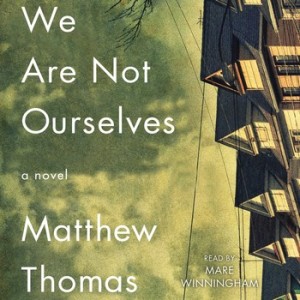![]()
 I’m a sucker for a good family saga, and We Are Not Ourselves is that indeed. We follow Eileen Tumulty, born in 1941 in Brooklyn to stereotypical Irish immigrant working-class parents (her father moonlights in bar, her mother cleans buildings). We see her struggle with alcoholism in the home and distant but loving parents, and we see how this nurtures her desire to achieve something more.
I’m a sucker for a good family saga, and We Are Not Ourselves is that indeed. We follow Eileen Tumulty, born in 1941 in Brooklyn to stereotypical Irish immigrant working-class parents (her father moonlights in bar, her mother cleans buildings). We see her struggle with alcoholism in the home and distant but loving parents, and we see how this nurtures her desire to achieve something more.
As a reader, I engaged in her life, going from high school to college to marriage to motherhood, parenting as a working mother all the way through her son’s adult years. So many contemporary issues that a family deals with are in here, but I don’t want to mention them by name, because I liked watching them unfold and puzzling over them myself. I was really pleased to see that the book description doesn’t put a name to them either, though I’m sure other online reviewers do.
I don’t often quote the book blurb, but I think it explains the story well without giving anything away, so it beats me just saying “If you like family sagas, read it.”
Eileen encourages her husband to want more: a better job, better friends, a better house, but as years pass it becomes clear that his growing reluctance is part of a deeper psychological shift. An inescapable darkness enters their lives, and Eileen and Ed and their son Connell try desperately to hold together a semblance of the reality they have known, and to preserve, against long odds, an idea they have cherished of the future.
Through the Learys, novelist Matthew Thomas charts the story of the American Century, particularly the promise of domestic bliss and economic prosperity that captured hearts and minds after WWII. The result is a riveting and affecting work of art; one that reminds us that life is more than a tally of victories and defeats, that we live to love and be loved, and that we should tell each other so before the moment slips away.
After I finished, I couldn’t help but ask myself, “If we are not ourselves, who are we?” I remembered a quote at the beginning, so I had to go back and look:
We are not ourselves
When nature oppressed, commands the mind
To suffer with the body.
—King Lear
After reading the book and knowing the struggles the Learys had, the title makes total sense. But even before I looked back at the quote, I thought about the view of one woman’s life. It was easy to make the connection that we don’t always belong to ourselves, which can make us a different self through the eyes of our parents, our spouse, our child.
NOTES ON THE AUDIOBOOK
Actress Mare Winningham was the reader on this book. She did a great job. The pace was somewhat slow, which sometimes bugs me in an audiobook, but it felt right in this one. My interested was totally held as I listened to this long book, and I wouldn’t change anything. You can hear an excerpt at the Simon & Schuster audio page.